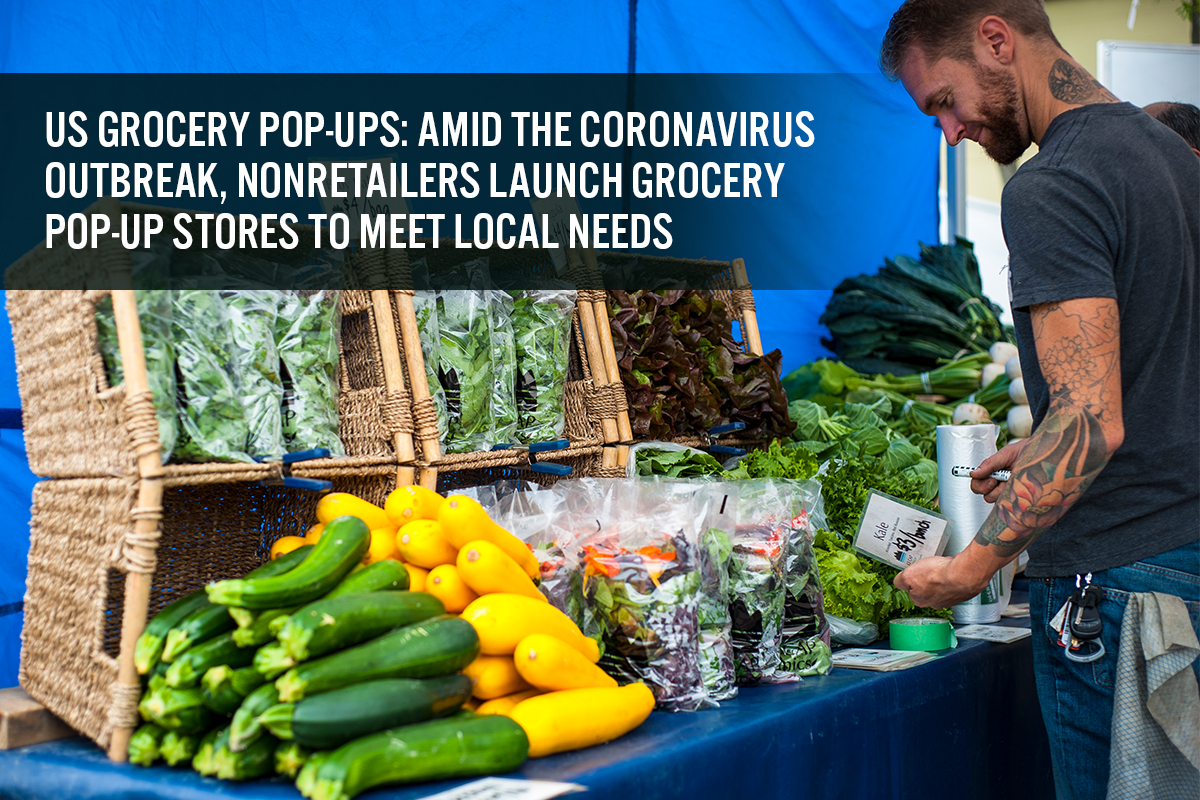
Nitheesh NH
Temporary pop-up stores can allow brands and retailers to take advantage of seasonal demand, trends and events, or to support marketing campaigns. The pop-up format allows retailers to showcase private-label products, experiment with new store concepts on a small scale, collect customer feedback on products and store design, and gain insights into evolving consumer trends and consumption patterns.
However, a new motivation for using the pop-up format has emerged due to the coronavirus outbreak. In response to a surge in demand for food products that is seeing shoppers clearing shelves at grocery stores, nonretailers have chosen to open grocery pop-up stores to meet the needs of local communities. In this report, we provide examples of this phenomenon in the US, as well as highlighting opportunities for grocery retailers to open pop-up stores after the pandemic. This report updates our previous coverage of the grocery pop-up format.
4 Rivers Smokehouse Opens a Pop-Up Grocery Store
4 Rivers Smokehouse, a Florida-based restaurant chain, turned its restaurant into a pop-up grocery store in March 2020. Florida banned restaurant dining on March 20, due to the coronavirus outbreak—one of around 29 US states to do this so far.
The 4 Rivers Smokehouse pop-up initiative, called “Groceries 4R You,” offers consumers an alternative source of essential products, as local grocers struggle to keep shelves stocked. The pop-up is selling its inventories of produce, including ground beef, chicken breasts, black beans, milk, beer and toilet paper. 4 Rivers Smokehouse has 23 branches in Florida, all of which are selling grocery products through the pop-up format.
[caption id="attachment_107345" align="aligncenter" width="520"]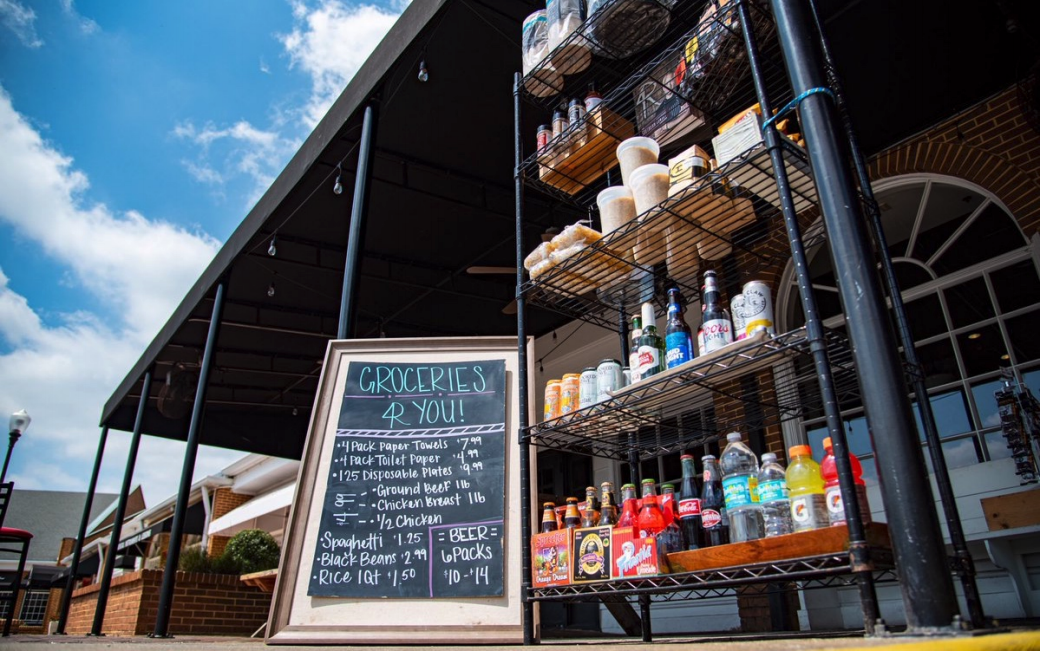 The 4 Rivers Smokehouse Groceries 4R You pop-up format
The 4 Rivers Smokehouse Groceries 4R You pop-up format
Source: Company website[/caption] Other restaurants across the US have also adopted the grocery pop-up store strategy: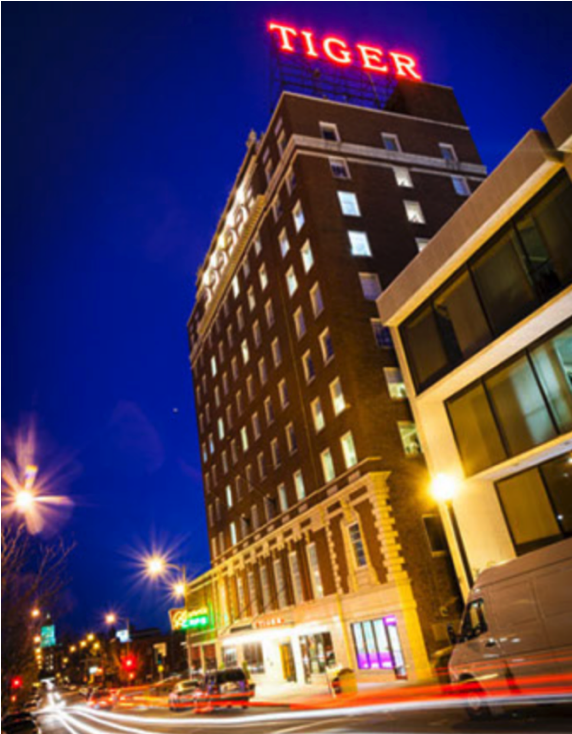 Tiger Hotel
Tiger Hotel
Source: Company website[/caption] Maryland Food Bank Donates Groceries to Those in Need Pop-up store formats also work well for nonprofit organizations that want to provide daily necessities to those in need during the coronavirus pandemic. For instance, Maryland Food Bank worked with Baltimore City Schools and local organizations to launch a pop-up grocery format for local residents in West Baltimore, Maryland. The pop-up store offers free products, such as canned goods and water. The organizers said they had received 1,000lbs of donated food as of March 19. The food bank distributes the goods on a first-come, first-served basis. [caption id="attachment_107347" align="aligncenter" width="520"]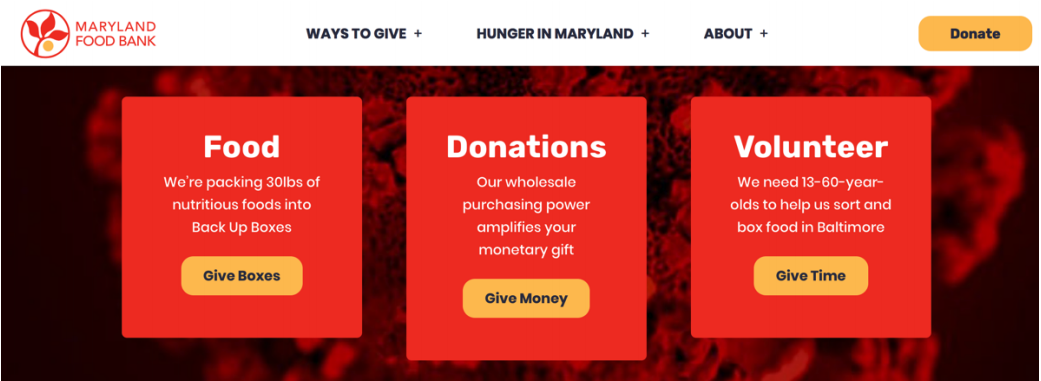 Maryland Food Bank’s online donation page
Maryland Food Bank’s online donation page
Source: Company website[/caption] Pop-Up Grocery Stores after the Pandemic Although the current crisis has seen nongrocery retailers launch pop-up stores, when the US returns to some form of normalcy following the coronavirus pandemic, we expect this retail format to play an important role for grocery retailers. Consumers prefer to buy grocery products from physical stores rather than by shopping online, as they like to see and choose products in person, according to a Coresight Research proprietary survey. Furthermore, consumers are now more ready to embrace grocery pop-up stores, and around two-thirds of US consumers believe that the future of the grocery sector would see pop-up stores or mobile supermarkets in urban and rural areas, according to a “2019 Shop of the Future” survey conducted by Regina Corso Consulting. Moreover, pop-up stores offer potential advantages for grocery retailers outside of the coronavirus crisis, as shown in Figure 1. [caption id="attachment_107348" align="aligncenter" width="700"]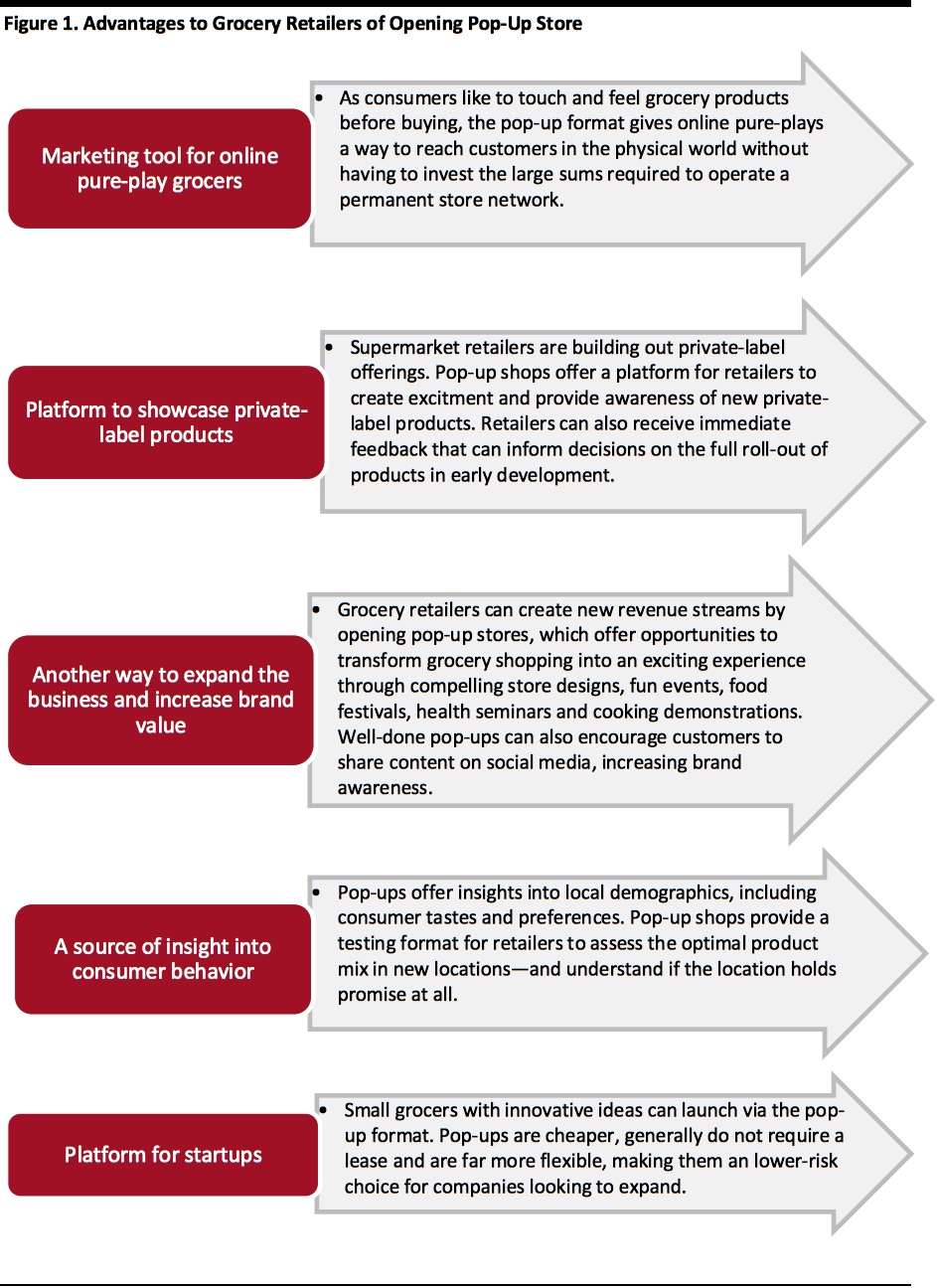 Source: Coresight Research[/caption]
Key Insights
During the coronavirus crisis, companies in the US have changed their business models to adapt to current market conditions. After the pandemic, we expect that the pop-up store format will be appealing for grocery retailers, as it caters to the consumer preference of buying grocery products offline while requiring low investment and low commitment.
Source: Coresight Research[/caption]
Key Insights
During the coronavirus crisis, companies in the US have changed their business models to adapt to current market conditions. After the pandemic, we expect that the pop-up store format will be appealing for grocery retailers, as it caters to the consumer preference of buying grocery products offline while requiring low investment and low commitment.
 The 4 Rivers Smokehouse Groceries 4R You pop-up format
The 4 Rivers Smokehouse Groceries 4R You pop-up formatSource: Company website[/caption] Other restaurants across the US have also adopted the grocery pop-up store strategy:
- Café Garden, Florida
- Nic and Norman, Georgia—owned by The Walking Dead actor Norman Reedus and Greg Nicotero, the show’s Executive Producer
- Red State BBQ, Kentucky
- The Stove, Nevada—the Henderson restaurant from Antonio Nunez and Scott Commings, the season 12 winner of Hell's Kitchen
- Walnut Kitchen, Tennessee
- Mi Terra Café, Texas
- Oceanfront, Virginia
 Tiger Hotel
Tiger HotelSource: Company website[/caption] Maryland Food Bank Donates Groceries to Those in Need Pop-up store formats also work well for nonprofit organizations that want to provide daily necessities to those in need during the coronavirus pandemic. For instance, Maryland Food Bank worked with Baltimore City Schools and local organizations to launch a pop-up grocery format for local residents in West Baltimore, Maryland. The pop-up store offers free products, such as canned goods and water. The organizers said they had received 1,000lbs of donated food as of March 19. The food bank distributes the goods on a first-come, first-served basis. [caption id="attachment_107347" align="aligncenter" width="520"]
 Maryland Food Bank’s online donation page
Maryland Food Bank’s online donation pageSource: Company website[/caption] Pop-Up Grocery Stores after the Pandemic Although the current crisis has seen nongrocery retailers launch pop-up stores, when the US returns to some form of normalcy following the coronavirus pandemic, we expect this retail format to play an important role for grocery retailers. Consumers prefer to buy grocery products from physical stores rather than by shopping online, as they like to see and choose products in person, according to a Coresight Research proprietary survey. Furthermore, consumers are now more ready to embrace grocery pop-up stores, and around two-thirds of US consumers believe that the future of the grocery sector would see pop-up stores or mobile supermarkets in urban and rural areas, according to a “2019 Shop of the Future” survey conducted by Regina Corso Consulting. Moreover, pop-up stores offer potential advantages for grocery retailers outside of the coronavirus crisis, as shown in Figure 1. [caption id="attachment_107348" align="aligncenter" width="700"]
 Source: Coresight Research[/caption]
Key Insights
During the coronavirus crisis, companies in the US have changed their business models to adapt to current market conditions. After the pandemic, we expect that the pop-up store format will be appealing for grocery retailers, as it caters to the consumer preference of buying grocery products offline while requiring low investment and low commitment.
Source: Coresight Research[/caption]
Key Insights
During the coronavirus crisis, companies in the US have changed their business models to adapt to current market conditions. After the pandemic, we expect that the pop-up store format will be appealing for grocery retailers, as it caters to the consumer preference of buying grocery products offline while requiring low investment and low commitment.